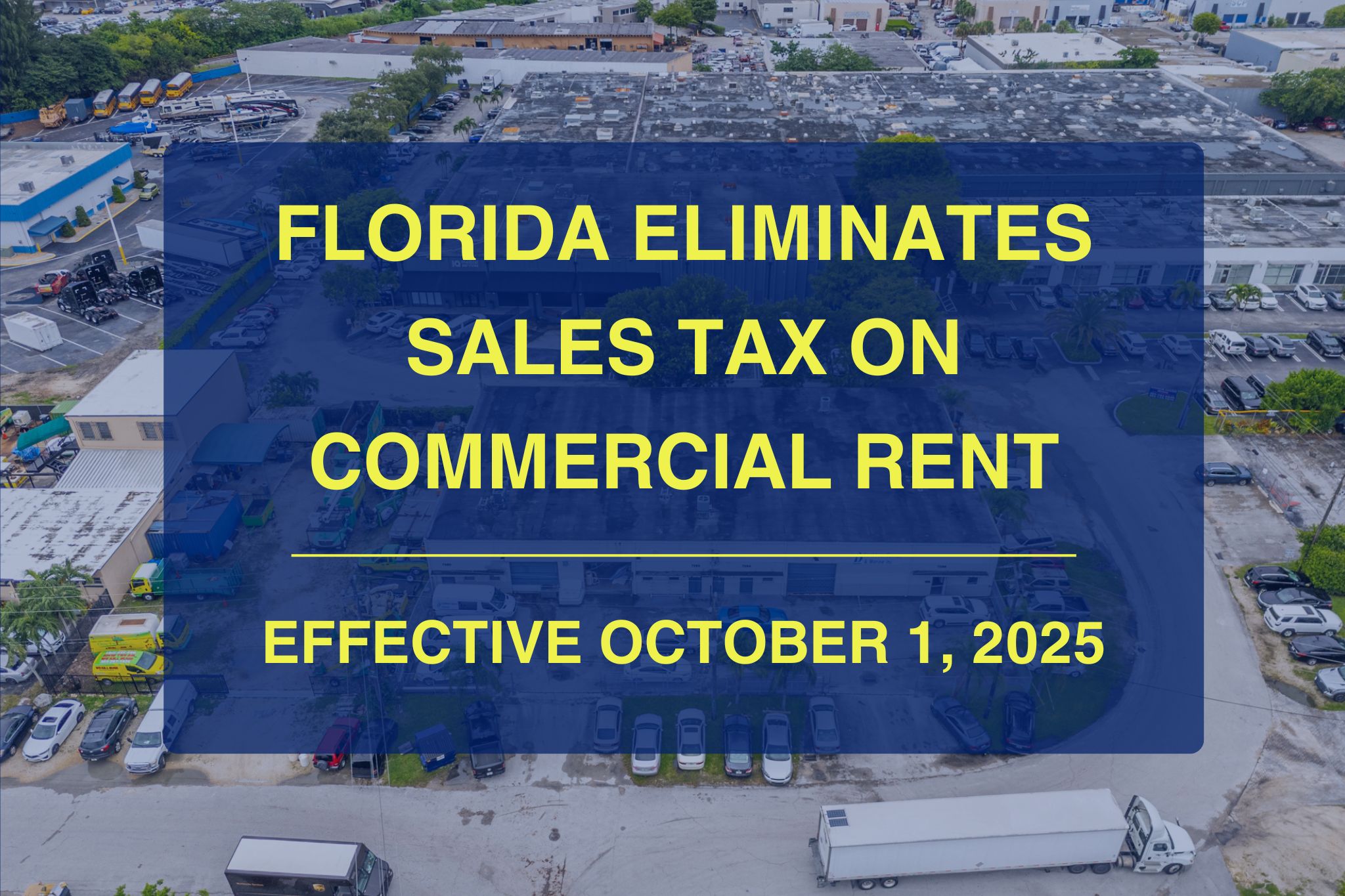Florida has just made a decision that will have a significant impact on real estate investors, business owners, and the commercial leasing market statewide. As of October 1, 2025, the state is eliminating all sales tax on commercial leases, including both the state’s 2% rate and all local surtaxes, such as the 1% tax previously levied by counties like Miami-Dade and Broward.
This change, introduced through House Bill 7031, positions Florida as an even more attractive destination for businesses and investors alike.
Understanding the Change
Until now, businesses leasing retail, office, or industrial space were required to pay sales tax on their base rent as well as associated costs like CAM and insurance. In many counties, this included both a state-level tax and an additional local surtax, adding up to a total of 3% in many parts of South Florida.
Here’s a snapshot of the local surtaxes that applied prior to this reform:
-
City of Miami, Coral Gables, and South Miami (all in Miami-Dade County): 1% local surtax, for a total commercial rent tax of 3% (2% state + 1% local)
-
Fort Lauderdale (Broward County): 1% local surtax, also totaling 3% (2% state + 1% local)
Starting October 1, 2025, these taxes will no longer apply. Counties are also barred from implementing any new taxes on commercial rent going forward.
Why It Matters for Property Owners and Investors
For real estate investors and landlords, the repeal translates into stronger fundamentals. With no sales tax on leases, gross rents become more attractive, boosting net operating income (NOI) and, by extension, asset values.
It also makes Florida’s commercial real estate offerings more competitive nationally. Compared to states like New York or California, where business costs are higher, Florida is removing one more barrier to entry. As a result, investors may see increased demand, stronger absorption, and more aggressive leasing activity.
From a practical standpoint, landlords will also benefit from simplified accounting. There’s no longer a need to calculate, collect, or remit sales tax on rent, which reduces administrative burden and the risk of costly compliance errors.
Benefits for Tenants and Business Owners
The savings for tenants are real and measurable. A business leasing 5,000 square feet at $30 per square foot—a $150,000 annual lease—was previously paying $4,500 per year in sales tax in Miami or Fort Lauderdale. That’s money that can now be reinvested into staffing, expansion, marketing, or simply reducing operating overhead. The change also helps make Florida a more attractive place for entrepreneurs, startups, and out-of-state businesses looking to relocate or expand.
Community and Economic Impact
Eliminating the commercial rent tax won’t just benefit individual businesses—it’s a move with long-term implications for local economies. As leasing becomes more affordable, vacancy rates may drop, especially in areas still recovering from the pandemic’s disruption of office and retail demand.
More competitive leasing rates can stimulate growth in key business corridors, encourage reinvestment in commercial properties, and drive job creation. This reform could be particularly impactful in places like Miami, Fort Lauderdale, Coral Gables, and South Miami, where the previous 3% tax represented a meaningful cost.
Planning for the Transition
The law takes effect on October 1, 2025. Landlords and tenants should review their lease agreements now to ensure they reflect the upcoming change. It’s important to note that sales tax still applies to rent for occupancy prior to October 1, even if that rent is paid after the fact. However, any lease payments covering periods on or after October 1, 2025, will be entirely exempt.
Both parties should work with their accounting teams to update invoicing practices and ensure compliance during the transition.
Final Thoughts
Florida’s repeal of the commercial rent sales tax is a significant win for the state’s business environment. It makes leasing space more affordable, enhances real estate investment returns, and strengthens the economic foundation of local communities. For investors, brokers, and business owners, it’s a great time to reassess strategies and take advantage of the opportunities this change will bring.
If you’d like help analyzing how this could affect your portfolio or upcoming lease negotiations, feel free to reach out.

 Facebook
Facebook
 X
X
 Pinterest
Pinterest
 Copy Link
Copy Link


